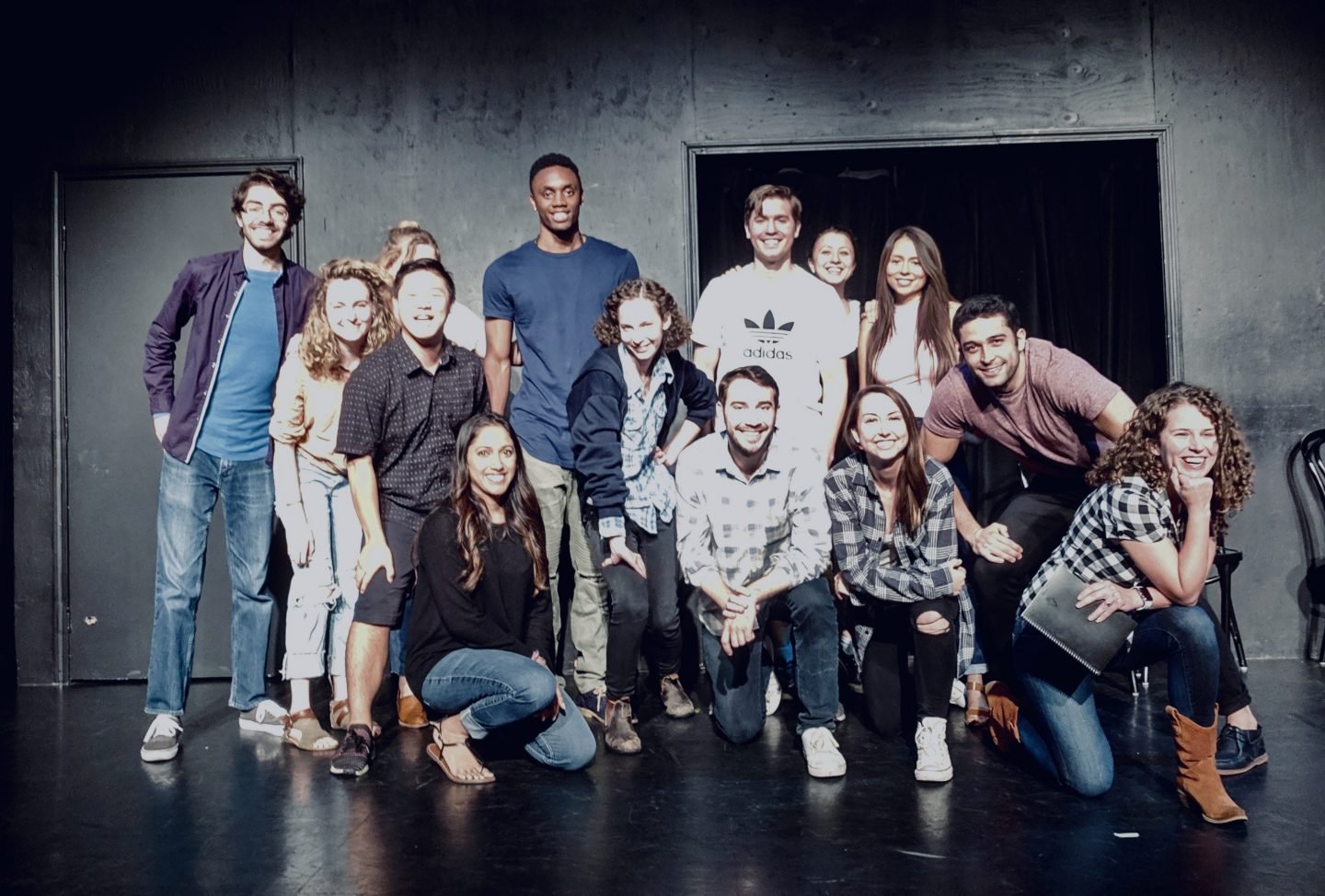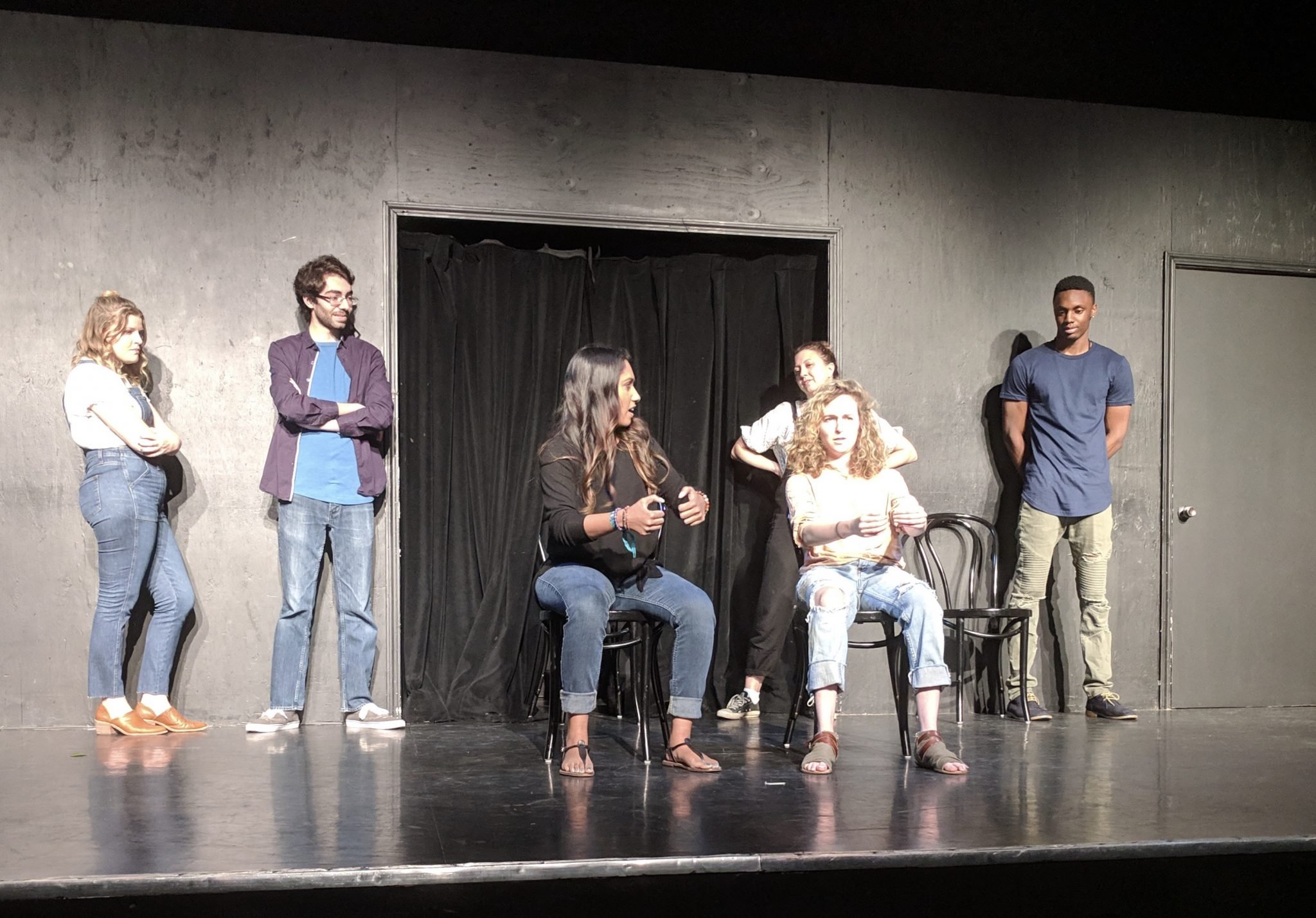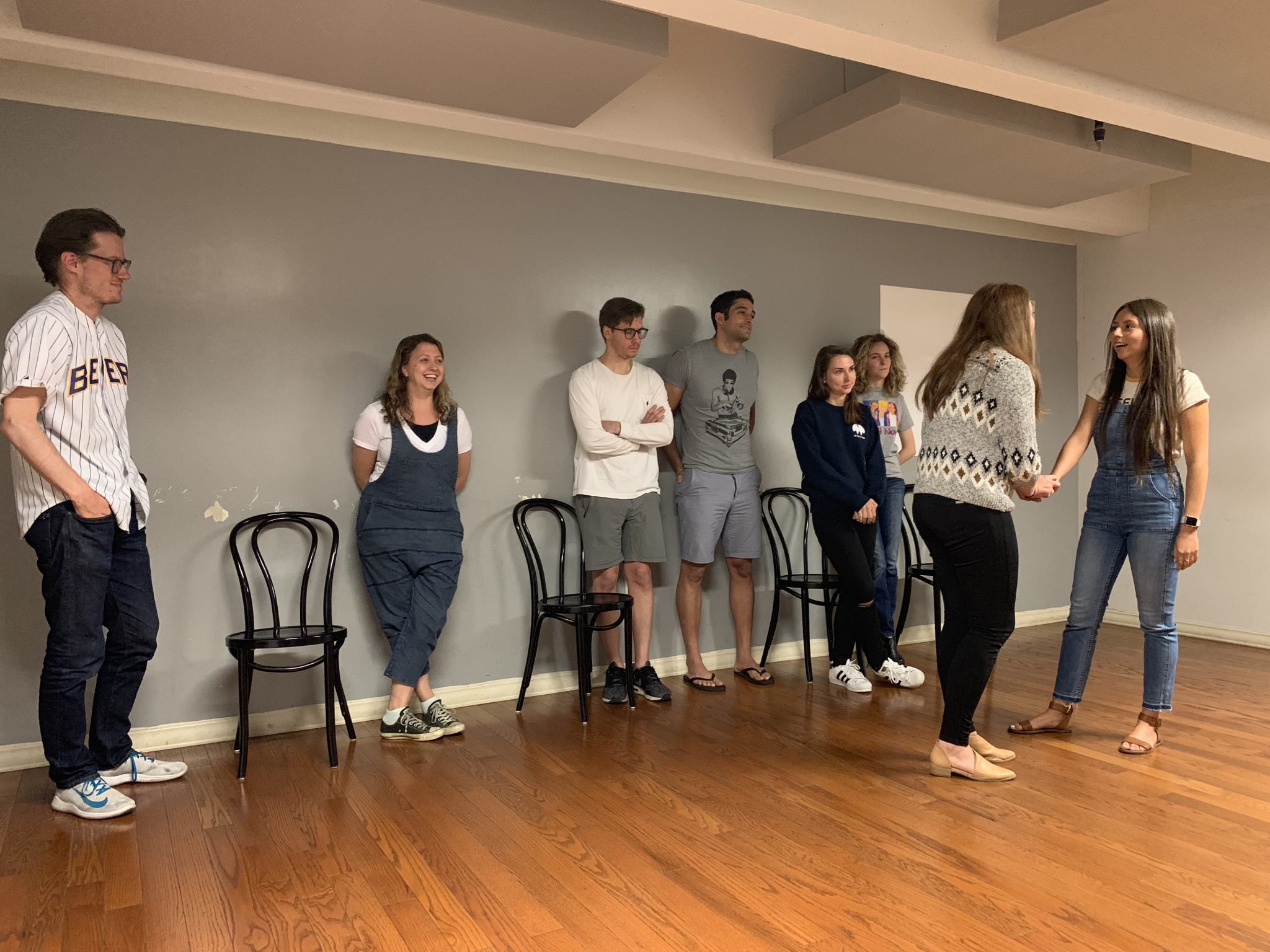Don't Try to Be Funny: Lessons From Improv

Wanted: More Laughter
I recently graduated from an Improv 201 class offered by the Upright Citizen's Brigade (UCB), a highly renowned improv school in Los Angeles, CA. I initially decided to start taking classes because when I considered the things that I wanted more of in my life, laughter was one of them. And as I am learning that we are the creators of our own happiness, I decided that instead of relying on others to create opportunities for laughter in my life, I would create my own. So after seeing a friend's Improv 101 graduation show, I decided to sign up for the 101 class myself.
But What About the Stage Fright?!
When I told people that I was taking improv classes, I assumed the first question would be whether I was doing it to break into acting (I do live in Hollywood, after all). Instead, most people asked if I was scared or nervous to perform in front of others. I guess that shouldn't have been that surprising since about 25% of people have Glossophobia (speech anxiety or the fear of public speaking).
I certainly get nervous when speaking in front of groups, but over the past couple of years, I've been fortunate enough to some public speaking at various tech conferences and meetups (check out my keynote talk on Partnered Leadership from Open Source Summit North America in 2017). This experience has helped me move from "oh god I'm going to be sick" nervous to "my voice is a little shaky in the first couple minutes" nervous. So the idea of doing improv in front of a small group of people didn't seem too daunting.
Expectations
Before I started my Improv 101 class, I assumed that we would learn how to come up with funny scenarios that people would then improvise on stage. I thought those who were naturally comedic would excel and that regular people like me would just follow along and try to contribute what we could.
I also assumed that everyone in class would have no stage fright, but as it turned out, several people were taking the class to eliminate (or at least reduce) their fear of public speaking. It's actually a really great idea. The class sizes at UCB are small (I think the maximum is 16 students per class) so it's really just you, a few strangers, and a very patient teacher. Over the course of the 8-week class (3 hours each class), you become more and more comfortable standing up in front of the group, and the nerves begin to fade into the background.
I think it's a wonderful way to reduce stage fright and add more laughter to life, but what I actually got from the experience was so much more than what I expected.
What is Improv?
Before I share what I personally learned from improv, I think it would be helpful to explain a little about what improv is and how it's taught. Skip ahead to the next section if you're already an improv pro or aficionado.
First, improv is typically performed by teams of 6-8 people, although I once saw a show with the ever-hilarious Jason Mantzoukas and only two other people and I was cry-laughing the whole time.
Second, there are different types of improv. The two main styles are short-form and long-form.
“Long form is one suggestion and then you improvise for 25 minutes, and in short form you are constantly coming to the audience for suggestions throughout the evening and treating each improv game as its own little three- or four-minute piece,” said Joshua Funk, artistic director at the Second City Training Center in Hollywood. (from backstage.com)
How Does Improv Work?
The "improv game" is essentially the pattern of interactions between characters in a scene where the unusual thing and the character's philosophies on the subject are comedic. (Note: This is my own definition but the actual definition is a hot topic for debate. See other descriptions here.) From what I understood after taking Improv 201 at UCB, here are the steps to finding the game:
- Suggestion
- The first thing a team does is ask the audience for a suggestion in the form of a single word.
- Monologue
- Based on the suggestion, there will be three monologues or personal stories. These stories should be full of rich details since they will provide the ideas or prompts for your scenes.
- They don't have to be directly related to the word (i.e., you go from A to B). For example, if someone suggests "pineapple" but sadly you have no stories about pineapples, you could offer an A-to-C relationship like "Pineapples make me think of Hawaii and that reminds me of the last time I vacationed there."
- Establish the who/where/what.
- Who are the characters in the scene and what is their relationship to one another? For example, are they husband and wife? Are they friends or roommates? Father and son?
- Where are they? Are they at a restaurant? The beach? In the kitchen of their home?
- What are they doing? Are they having dinner? On a first date? Deciding on new paint colors for the kitchen?
- Identify the unusual thing
- Typically this is one of the character's perspectives on something. The other character will either be unusual in the same way or they will act as the voice of reason and question the unusual character's response to actions they introduce in the scene.
- If this is true, what else is true?
- If the unusual character sees the world a certain way (e.g., a person who thinks that because they've traveled as a passenger on airplanes many times qualifies them to be a pilot), then what else is true (do they also think that eating at restaurants qualifies them to be a chef)?
The best way to experience great improv is to go see a show. In LA, we are incredibly fortunate to have so many options available to us; I highly recommend Bangarang, ASSSSCAT, and Harold Fridays at UCB (see current schedule to buy tickets). And if you're in Chicago, Second City is a MUST.
Okay. So now that you know the basics of improv, here are some things that you might not have guessed you would learn from taking classes.

Life Lessons From Improv
Being Present
One of the very first lessons I learned from improv was that you cannot be a good scene partner when your mind is somewhere else. If you're not paying attention to what your partner is saying, you are likely to miss the essential elements of a good scene. They may be laying up the who/what/where in their very first sentence and if you miss it, you are totally missing a chance to build of a really fun idea.
This can also happen when you're not in the scene but on the "back line," which is where performers stand during the introduction and when they are not giving a monologue or participating in a scene. If you aren't paying attention to the monologue, you could be missing important and fun details that would make for a great scene. It's even more important when you're in the scene.
I remember when I learned this lesson early on during a 101 class when I stepped out to do a scene. My partner had stepped out first (which usually means they have an idea of how to start the scene) and because I was the only person left in my group who hadn't joined a scene yet, I stepped out too. But instead of being present, I was still in my head trying to figure out what funny thing I could start the scene with.
My partner began the scene with the who/what/where - we were a couple at on a second date at a restaurant. But instead of responding to his first line, I went blank. I wasn't listening and I didn't know where he was trying to go with the scene. As soon as I realized I needed to stop trying to come up with my own idea and just go where he was leading me, the scene began to form and we even got a couple of chuckles.

"Yes, And"
One of the core tenets of improv is the idea of "Yes, and..." which means that when someone offers up an idea, even a ridiculous one, you go along with it and add something more to it. Example:
- Initiating Partner: Hey, I'm so glad we decided to rob this bank together.
- Scene Partner: Yeah, especially after the 7-11 robbery last week didn't go so well. We really need to remember to wear masks this time.
The minute someone says "No, that's dumb" you kill the scene. Even when the scene is set up with an unusual person and rational person, denying the truth that your scene partner has laid out for you will likely cause it to land flat. Example:
- Initiating Partner: Hey, I'm so glad we decided to rob this bank together.
- Scene Partner: What? No, we can't rob this bank, that's crazy!
If the rational scene partner were to say something like, "I can't believe you dragged me into another robber after 7-11 was a complete failure. This one better work out for us," then your scene can still go somewhere.
Now how does this apply to life?
Instead of denying the things that show up, what if you said: "Yes, and"? If you got laid off at work, you could be angry and upset or you could say, "well, now I've got some time to really consider what it is that makes me happy and go after that." It's not just about finding a silver lining; it's about seeing something that could initially be perceived as a door closing, as a door opening to something brand new.
Which leads me to my next lesson.
Allowing Instead of Planning
I think this was the biggest lesson of all for me. My entire professional career has been centered around planning (learn more about me here). First as a project manager, then as a manager of project managers, and now in my current role which is largely focused on helping to organize and fund multi-million dollar technology programs (i.e., large, complex groups of projects).
One of the things I've been working on over the last year or so is trying to plan less and be more spontaneous. I couldn't have asked for a better teacher than improv. I quickly found that whenever I had an idea for a scene and stepped out with a clear plan on how to deliver what I thought was really funny, it didn't always work. However, when I walked on stage and had just a nugget of where to start and then allowed the conversation with my scene partner to flow, we "yes, and-ed" into a scene that was far more funny than the one I had planned.
You can even see this when you go watch a professional improv show. The audience will provide a suggestion, you'll hear a monologue and then you'll have your own ideas of where you think it'll go. Then suddenly one of the team members steps out and starts the way you thought you'd start the scene. But then it takes a turn. Their scene partner adds something different, and then a walk-on from the back line contributes something that changes the direction of the scene. In the end, tears of laughter are streaming out of your eyes because it was hilarious in a way you didn't think possible.
The point is not just that you shouldn't try to be funny.
The point is that when you go with the flow and adapt as new information is presented, the end result is likely to be far better than you could've imagined from the outset.
I strongly believe that this idea, when applied to life, will result in more interesting, exciting, and (hopefully) funny opportunities and adventures than you could've dreamed up on your own.
A Next Step
As with all life lessons, they're not always easy to incorporate into your day-to-day. However, with these thoughts in mind, we can start to notice when we're trying to control or plan the outcome and when we are saying no instead of "yes, and."
Also, if you've ever considered improv or are looking for a way to add more laughter in your life, I highly recommend that you sign up for an Improv 101 class at UCB. Worst case scenario, you get an extra 3 hours of laughter each week. If you're lucky, you get to leave with some wonderful and funny new friends.


I hope that you enjoyed this post and that if you're on a path to add more spontaneity and laughter to your life, you'll consider taking an improv class. As always, your feedback means a great deal to me and I'd love to know what your thoughts are on any of these topics or ideas so please comment below.
With love and blessings,
Bindi

